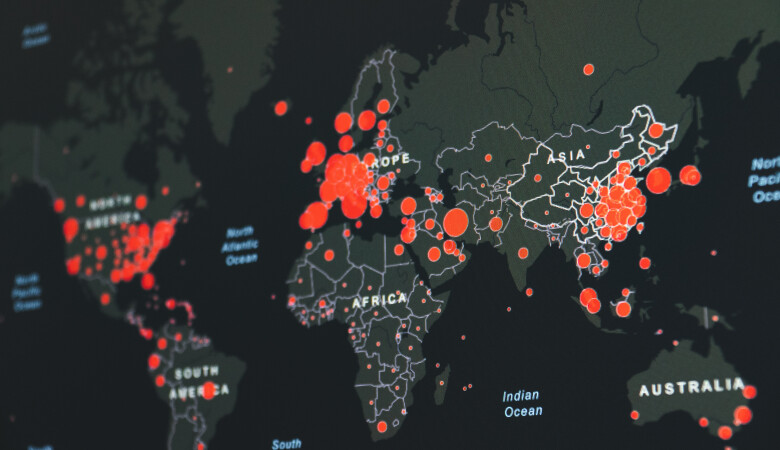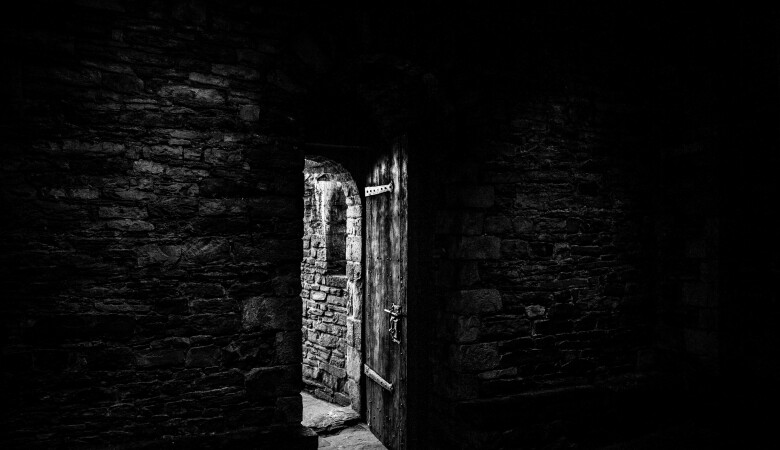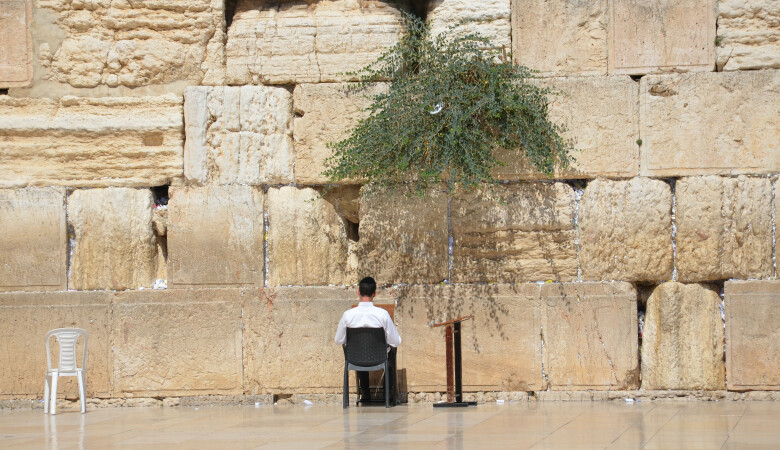Series: Mark
The Lesson of Wineskins: The Gospel is New and Powerful (Mark Sermon 10)
March 13, 2022 | Andy Davis
Mark 2:18-22
Christ and the Old Testament
Pastor Andy Davis preaches on Mark 2:19-22 about the NEW and POWERFUL gospel that saved many from an eternity in hell and placed them in eternal heavenly glory.
- TRANSCRIPT -
Take your Bibles and turn to Mark 2. Today's text, I think, is all about power, the surging energy to make change, to make things new. That's what power is. Power in this world is manifested in two ways, constructive and destructive power. The greatest constructive power ever in this physical universe has been at creation, when God said, "Let there be," and there was. The world that God made was beautiful and orderly and very good, but then came the destructive power of evil. Sin entered the world through one man and death through sin. And in this way, death came to all, because all sinned, and this beautiful world was cursed by the power of death. With this cursed world, lesser power has charted the subsequent course of history, both constructive and destructive power.
Humanity builds, but then death destroys. Nature destroys. Things rise up, they reach their peak, and then they fall back down to the earth. Empires rise, and then they fall back into the dust from which they came. Trees grow up from acorns, and they get massive and majestic, but eventually, they are toppled and they fall to the ground, and they rot and they're gone. Everything humanity puts its hand to eventually becomes dust. Constructive power in this world is overtaken by destructive power. This is our life in this cursed world. But God, in His goodness, interjected a power for eternal good, the power to make change, to make things new, to build a kingdom that will last forever and ever. This power to make all things new is the Gospel of Jesus Christ. It is infinitely powerful. It rises and surges and moves and acts and builds, and what it builds will last for all eternity, the power to make a new world. This new power of the Gospel cannot fit in to the old husks of manmade religion. That's what this passage really addresses, old and new. Look at verse 21, you've got new cloth and an old garment, and then verse 22, you've got new wine and old wineskins. You've got the dynamic of new and olds, and how they don't fit together. The new is dynamic, it’s powerful. It's ready to change every person from the inside out, and make everything new, to transform by the renewing of the mind, and ultimately, to change the entire universe, to bring in a new heaven and a new earth, where everything is new. The old religion, old patterns, indeed, even the Old Covenant itself could not bring this about.
Fasting at a Wedding?
When this all starts, this whole thing starts with a question about fasting. What is fasting? For the individual that came to Jesus, it's an effort to address the destructive power of sin by religion, to harness the body of all of its wicked rambunctious ways, to tame it like a wild stallion that needed constantly to be broke to the saddle. Fasting, in this case, was invented by man to make a way to God. Look at verse 18, John's disciples and the Pharisees were fasting, and some people came and asked Jesus, "How is it that John's disciples and the disciples of the Pharisees are fasting, but yours are not?" Legalistic religion is here to hunt Jesus down and trap him based on His own behavior. Here we see fundamental, false religion coming, the effort to mortify the deeds of the flesh, yourself, on your own. John Owen, talking about mortification in this sense, said "Mortification, putting sin to death, from self-strength, carried on by ways of self-invention, unto the end of self-righteousness, is the soul and substance of all false religion in the world." To put it in simple terms, holding back or harnessing sin from your own strength, in a pattern that you invented yourself, so that you can be self-righteous and feel like you defeated sin by yourself, that's the essence of all false religion in the world. That's what came to Jesus that day.
Now Jesus has already exposed this again and again. He's going keep battling this. In the Sermon on the Mount, in Matthew 6, He exposes three patterns of piety. Conspicuous piety was being done by the religionists of Jesus' day. Conspicuous giving to the poor and needy, that's announced with trumpets, so everyone sees it done. And conspicuous praying, that's done on the street corner, so everybody can see how pious you are. And conspicuous fasting, which is done in this way, Matthew 6:16, "When you fast, do not look somber as the hypocrites do, for they disfigure their faces to show others that they're fasting." I don't know if I want to make a horrible face right now in front of you, but it's something like, "Oh." "How are you doing today?" "It's a hard day." "Really? What's going on?" "Well, I'm not eating today. I'm fasting today, et cetera." "Don't do that," Jesus said. "When you fast, put oil on your head. Wash your face, so it will not be obvious to others you are fasting, but only to your Father who sees what has done unseen, and your Father sees what has done unseen will reward you."
Now, fasting was actually established in the law of Moses once a year, connected with the day of atonement, a day to afflict yourself, the text says in Leviticus 16:29. So it was in there, once a year. And, from time to time, the nation would be called on by spiritual leaders to fast, as a time of national mourning over sin, as in Nehemiah 9:1, when the Jews were intermarrying with pagan women again, and there was a time to fast and grieve before God over this wickedness. Or sometimes, an individual would fast over his own sins, like David did, after he sinned with Bathsheba. Sometimes, an individual like Ezra would fast before a dangerous journey, and ask God's help and protection. So that fasting would be individual to something you would do from time to time.
But the Pharisees, the pictures of legalistic religion of self-effort, went far beyond this. They established a pattern of fasting twice a week. Jesus talks about it in the parable of the Pharisee and the tax collector. The Pharisee goes up and Jesus says the Pharisee’s praise was about himself," "I thank you, God, that I'm not like others. I'm not like robbers and evil doers and adulterers, or even like this tax collector over here. I fast twice a week and give a tenth of all that I own." There's that pattern, that twice a week fast. They establish this rhythm of legalistic fasting in their religion, and then they spread it to burden the conscience of people around them saying, "Effectively, you're substandard Jews, if you didn't join us in these fasts." Substandard Jewish people, and people bought into it. They were afraid of them. They didn't want to be seen that way, substandard, so they gave in to these twice a week fast. It was a time of mourning, a time of disfiguring your faces to show others that you're fasting, you're on board. You're doing the fast that everyone else is doing. The poison in all of us is thinking that, by these means, you can pay for your sins. God's going to be pleased with this, and basically, blackmailed into welcoming you and accepting you, because of your harsh treatment of the body. These fasts, therefore, are symbolic of self-styled religion, self-efforts at paying for sins and blackmailing God.
John the Baptist's disciples, some of them were wrapped up in it. John's movement was massive. Tens and tens of thousands of people went out to him and heard him preach, and were baptized by him in the Jordan River. It's a big movement. They confessed their sins, and they received John's water baptism, but then what? What do we do now? John had called them to produce fruit in keeping with repentance. What did that look like? They were a bit adrift. John was just going to keep doing his baptismal ministry there, so a lot of these folks attached themselves to the Pharisees and fit into this pattern of legalistic piety. They're doing this. Infinitely worse though, these John's disciples didn't hear his central message about Jesus, the one who was coming after him whose sandals he was not worthy to stoop down on and tie, who would be the Lamb of God who would take away the sins of the worlds, who even greater than that was the Son of God. They hadn't heard that, so they came with disrespect and judgmentalism to Jesus, questioning Him.
So what's the context? The feast at Levi's house that we studied last week. Levi is Matthew, and Levi was a tax collector. Jesus called on him to follow. Levi left behind that old life and became a disciple, a follower of Jesus, and they had a big feast at Levi's house, and many of his friends came. They were tax collectors and so-called sinners were all there. It was a big feast, and an amazing work of God had happened. Many of those people repented of their sins and turned away from their wickedness and became followers of Christ. It was an incredible day, a day of feasting and a day of celebration. It was not one of that one day in the year required by the law of Moses in which he would fast. Yes, he would've done that. It wasn't that. So, the Pharisees and John's disciples come up, and they're criticizing Jesus. Jesus does not seem at all concerned with their accusations. Do you get that sense? Not worried about it at all. "Oh, they don't think well of me," not worried about it. He's celebrating the work of grace done in the lives of sinners at Matthew's house, happy with what God had done. Jesus exposes their ignorance of Him and of the times. Look at verse 19, "Jesus answered, 'How can the guest to the bride groom fast while he is with them? They cannot, so long as they have Him with them. They don't know who He is, and they don't know when it is, what's going on now.'" They're not aware of what's happening. What are the signs of the times? What's going on?
We have this image of a bridegroom, a marital image, which was common in the Old Testament prophets, a relationship between Yahweh, the God of the Jewish nation, and the people. It was like a marital relationship sometimes, in the prophets. It was foreshadowed also by the apostle Paul, picking up in Ephesians 5, the connection between Jesus and the church being like a marriage, the church seems to be the bride of Christ. Then we get that beautiful picture in Revelation, how the new Jerusalem, the people of God, come down out of heaven prepared as a bride for her husband. This beautiful image of a bridegroom getting together with the bride, a picture of eternal love relationship between God and His people. John the Baptist had used the image actually. John had brought it up. In the Gospel of John, John's disciples were coming and John was losing market share to Jesus. Remember that? Like, "Lots of people are going after Jesus now, John. We got to do something. We got to prop up the numbers. I mean, we're losing popularity here." And said John, "You don't understand what's going on." In the Gospel of John 3:29-30, John said, "The bride belongs to the bride groom. The friend who attends the bride groom waits and listens for him and is full of joy when he hears the bride groom's voice. That joy is mine, and it is now complete. He must increase, and I must decrease."
Let's be honest, who fasts at a wedding? When a man throws a wedding banquet, his happiest day of his life, he kills the fatted calf and puts out the best foods and the best drink, and he lavishly appoints this feast and invites his friends to come. The he finds one at the banquet who's not eating anything and looks pretty miserable. His face is disfigured. "What's up?" "Oh, I'm fasting today." "Don't do that. Eat my food. Drink my drink. It's a time of celebration.” This is a time of joy. Jesus says, “My people get to hear my voice. They get to see my face. They get to see my miracles. They get to see my love and my kindness and my personality. They get to understand and drink in my wisdom. They get to sit with me and be with me. And do you understand how many people in the past would've longed to be here during this time?” But they didn't get to do it. He openly said that in Matthew 13, to His own disciples, "Blessed are your eyes because they see, and your ears because they hear. For I tell you, many prophets and righteous men longed to see what you see and did not see it, and longed to hear what you hear and did not hear." He's talking about the times of the Messiah, to be there when Jesus walked the earth. It was a time of joy, a time of celebration, and the Pharisees and John's disciples come there with their grumbling stomachs. How are you when you fast? Are you happy? Are you good company? I've gone to bed early on fast days, just to get away from people. So imagine some irritable men, who haven't eaten in a while, they are grumpy, hey bring their joyless legalism. They're condemning the guests at the wedding banquet, condemning them because they're celebrating when they should be drinking in and feasting like Jesus' disciples were. They're so messed up. Legalism messes them up. Jesus came to bring joy, not sorrow, the joy of sitting at the table with God.
Legalism kills joy. One expression is “buzz kill.” Others, you've heard “kill joy,” or “wet blanket.” The legalists are buzz kills. In the book of Galatians, when Paul's addressing a legalistic Gospel that's come in under the so-called Judaizers who bring in circumcision as a doorway to an entire legalistic way of life that was not the Gospel, he asked them a simple question. He had led these people to Christ, to the preaching of the Gospel. In Galatians 4:15, he said, "What has happened to all your joy?" Watch out for legalism, First Baptist Church, watch out, it kills joy. Not only that, one chapter later, in Galatians 5:15, he says, "If you keep on biting and devouring each other, watch out, or you'll be destroyed by each other." Legalism pits faction against faction of self-righteous people, who are vaunting their own righteousness against others, and it divides people and destroys.
However, the joy that Jesus came to bring at that point was not complete. It's still not complete. The journey isn't over yet. We're not in heaven, sitting at table with Abraham, Isaac and Jacob in the kingdom of heaven. We're not there yet. Look at verse 20, "'The time will come,' He says, 'when the bride groom will be taken from them. And on that day, they will fast.'" That's talking about our earthly lives here before we get to heaven. He's talking, first and foremost, about Jesus' crucifixion. He would be taken away by arrest, and they could not follow Him. He had to be alone. Jesus said on John 16:20, "I tell you the truth. You will weep and mourn, while the world rejoices. You will grieve. But, your grief will turn to joy." So they were going to have a time of grief and sorrow, but then after the resurrection, Jesus will be taken up to heaven and there would be work to be done.
That work we've characterized in this church is progress along two journeys, an internal journey of holiness, and sanctification, an external journey of Gospel advance through evangelism and missions. Fasting will be connected with those two journeys. There'll be times to fast for those. Christian people do fast from time to time, to grieve over sin, to show seriousness in repentance, as David did. We'll do that. Or sometimes, to be focused in prayer for strategy and wisdom, as in Acts 13, when the church of fasting and praying, and then the Holy Spirit said, "Set apart from me, Barnabas and Saul, for the work to which I've called them." a time of fasting and focus and all that, there's going to be time for that. But let me tell you something. We're not going to be fasting in heaven. That's a time of heavenly celebration, and the bridegroom will not be taken from us then. It's temporary.
Twin Parables: Unshrunk Cloth & New Wine
To illustrate this, Jesus gives us two parables, a twin parables, one parable doubled. Same parable, different aspects, but it's doubled for emphasis. It's very important that we understand it. Parable number one, the unshrunk cloth and the old garment. Verse 21, "No one sews a patch of unshrunk cloth on an old garment. If he does, the new piece will pull away from the old, making the tear worse." You have the image of an old garment, an old shirt, an old tunic, an old robe, an old cloak, something like that. It's been washed many times. Perhaps it's even a little faded, just old. It's an old garment, and it's got a hole in it. It needs to be repaired. Jesus said, "It would be foolish. No one does this, to take a piece of “unshrunk," it's literally unfolded or unwashed, it's what the Greek is, that hasn't been through the washing process yet. It's never been through that. “Whenever a cloth like that is washed for first time, it shrinks. It pulls in, changes its dimensions, and if you sew that on an old garment, it's going to tear away from the old garment," Jesus says, "making the tear worse. It'd be foolish to combine them." So that's parable number one.
Parable number two, the new wine and the old wineskin. Verse 22, "And no one pours new wine into old wineskins. If he does, the wine will burst the skins and both the wine and the wineskins will be ruined. No, he pours new wine into new wineskins." What's a wineskin? In those days, the actual skin of an animal would be used as a container for wine. They would, I think, generally treat it with certain processes, turn it inside out, sew up certain portions of it, leave another portion open and pour the wine in and then put a stopper in it. That's a wineskin. The new wine in the new wineskin would begin to ferment and put off gases, and the gases would cause the wineskin to expand like a balloon. It's a new wineskin. It's supple. It's flexible. It can blow up like a balloon.
But an old wineskin, it's been exposed to the sun. It's been dried out over a long period of time. It's lost its elasticity, it’s inflexible. If you pour new wine into the old wineskin, eventually the pressure built up from the gases will cause a rupture. The old wineskin will be destroyed, and the new wine is lost, poured out on the ground. Both are ruined, Jesus says. So people knew to pour new wine into new wineskins and both were preserved. That's the second parable. Both of them have to do with a new dynamic that's powerful and moving, and doesn't line up with an old matrix that cannot move. It's inflexible and it's stuck in its ways. That's the same parable twice. Additional detail from Luke, in Luke 5:39 says, "And no one, after drinking the old wine, wants the new, for he says the old is better." He doesn't want the new thing. He's set in his ways, so it's basically a person. The new wine tastes weird to them. They don't want it.
The Gospel is New
What do we draw from this twin parable? Lesson number one, the Gospel is new. A new piece of cloth and the new wine, these represent the newness of the Gospel, the newness of Christ and the work He came to do. Our top priority in life is to understand this new Gospel of Jesus Christ, to wear the new garment made out of these new truths, the whole garment made out of new cloth, and to drink the new wine of this new work Jesus came to do; for us to delight in the newness of Christ and His new work in our lives and in the world. The Gospel is new. I've been doing a lot of study recently in the book of Ecclesiastes. Those close to me are kind of weary of hearing that everything is vanity. Vanity of vanities. Vanity of vanities. "Andy, when are you going to memorize the next book? It's time to move on to a new book." It says in Ecclesiastes 1, "Is there anything new in the sun? There's nothing new under the sun." Yes, there is. The Gospel is new. The New Covenant is new. This is what new means when it says New Covenant. This is a new thing that Jesus came to do in the world.
What is the old garment, the old wineskin? These certainly in immediate context represent the legalistic religion of the Pharisees and of John's disciples here. Following that approach to religion, legalism is inflexible, it is not changing. They have traditions they have handed down from one to the other, from generation to generation, that are not changing. This traditionalism is not moving. It is inflexible. Set, like the old garment that's set in its size. It cannot move. Like that old, weathered, hard, bridled, unyielding wineskin, that's what legalism does. That's what traditionalism does. It cannot respond to the newness that Jesus came to bring into this world, and I would just say in general, Jesus will not use them as vehicles to spread the new work He's doing. He will not use that.
Christianity therefore is new. It is unique. It's unlike anything else on earth. It is fresh, it is alive, living and active, beautiful. It's aromatic and fruitful. That's Christ. Ultimately, newness is all about Christ, isn't it? It's all about Jesus. There's never been anyone like Him in history. There is no one like Jesus. They could not understand Him. He is the bridegroom, come to seek and to save and to draw in His bride. He is the God man, fully God, fully man. Anyone who has seen Him has seen the glory of God himself in human form. He stands alone, and with His advent into the world, history itself was changed. Everything would be impacted. He was new. His life, new. His miracles, new. His teachings, unlike any words that anyone had ever heard. The enemy sent soldiers to arrest Him, and they came back empty-handed and dumbfounded. “No one has ever spoken like this man,” [John 7:46]. They'd never seen anything like His miracles ever. They said this again and again, "We've never seen anything like this." Never.
Remember when the man born blind was healed by Jesus. You remember how Jesus spit and made mud and put them on the man's eyes? He said, "Wash," and he could see. This man knew enough to say this, in John 9:32, "Never since the world began has anyone ever heard of opening the eyes of a man born blind?" This has never happened before. This is new, something entirely new. And it's never been duplicated since. There's not been lots of Jesuses since. There's been no one like Him since. He is unique. He is new. He is the new cloth. He is the new wine. And He is the consummation of human history. Jesus. Who else could say, "I am the Alpha and the Omega, the first and the last, the beginning and the end. I'm everything. I am the story."? Who else could say, "Anyone who has seen Me has seen the Father."? Who else could say, "Before Abraham was born, I am”? This new man, this Jesus, brings a new religion, a whole new way of expressing life and love for God. Christianity could never have fit into the old pattern. The old religion that was established by God in the Old Covenant was now, at the coming of Jesus, obsolete. It was holy and righteous and good for its time. It had a role, a purpose, to play. But once Jesus came, and especially once He died on the cross, and the curtain in the temple was torn in two from top to bottom, that symbolized the end of the Old Covenant. Done. Obsolete. Finished. In some sense then, the Old Covenant was the old garment and the old wineskin. I've often wondered, what wicked priests sewed up that curtain, so that they could keep doing animal sacrifice for another 30, 40 years? You know in the whole marriage and divorcing, it says what God has joined together, let man not separate? Well, how about the opposite? What God has torn apart, let man not sew back up.
He made a new and living way for sinners like you and me to come right into the presence of the Holy God. That's the power of the blood of Jesus, and He means for us to draw near. The Old Covenant could never do that. The Old Covenant could not bring in the new heaven and new earth, could not make a new man or new woman out of us. The Old Covenant was weak and powerless and unable. These are adjectives used by the New Testament writers for them, “And what is obsolete and aging will soon disappear,” [Hebrews 8:13]. The religion that Jesus came to work would be entirely new. Animal sacrificial system would be gone. The temple would be gone. The Levitical priesthood would be gone. Ceremonial laws of circumcision, food restrictions will be gone. The Old Covenant's wineskins could not hold this new wine. That was the end.
Now, if the holy and God-ordained Old Covenant was obsolete, how much more this legalistic manmade thing, that they had concocted out of their own minds? How much more was that manmade, legalistic religion obsolete and gone? God never ordained this twice a week fast. It was something they made up. So see how new this wine is. Jesus came to make you into a new person, to transform you. The first verse I ever memorized, in The Navigator's Topical Memory System, 2 Corinthians 5:17, "Therefore, if anyone is in Christ, he's a new creature, new creation. The old has gone. Behold, new things have come." Everything is new when you become a Christian. Jesus said to Nicodemus, "You must be born again. No one can see the kingdom of God unless he is born again. I can't pour the new wine of my work, cannot pour the new wine of the indwelling Holy Spirit into an old soul, an old person. I've got to make you new. You got to be born again. You got to be made into a new person by the spirit of God, something only God can do." He said, "You should not be surprised at my saying, 'You must be born again.' The wind blows wherever it wishes, and you hear the sound of it, but you cannot tell where it comes from and where it is going." That's what it's like, so it is with everyone born of the spirit. You have to be born of the spirit and the new wine of Christ, and His spirit and His work can be poured into you.’”
When the new wine of the Gospel pours into you, you become changed in every respect. You have a new mind, it’s called the mind of Christ. You now think differently about everything, about God, about humanity, about sin, about your life, your time, your money, your marriage, your parenting, your job. Everything becomes new, and it takes a long time for that newness to set in. But that's what it means to be transformed by the renewing of your mind. That's the privilege I get week after week to preach, the whole counsel of God, to make you entirely new and get you ready for the new world that's coming. Me too. And it's coming, because it says in Revelation 21:5, "He who is seated on the throne said, 'Behold, I am making everything new.'"
So, I have a new thought project here, from Ecclesiastes. Maybe there really is nothing new under the sun, if new means eternal. Everything you see with your eyes is temporary, friends, everything, but there are eternal things you cannot see. There are souls that are redeemed by the blood of Christ and by the spirit of God, those are new, and they will last for all eternity. Everything else, there's nothing new. But the Lord is going to make a new heavens and a new earth. Everything is going to be made new, transformed by the One seated on the throne. So, lesson number one, the Gospel is new.
The Gospel is Powerful
Lesson number two, the Gospel is powerful. The image of both the new cloth and the new wine is power. We're not staying put. The new cloth shrinks powerfully, the new wine expands powerfully. If you can't follow me in my shrinking and my expanding, then you don't understand the power of the Gospel. What do you think should shrink? How about me? “He must increase. I must decrease.” How about that? My sin tumor should shrink. Patterns in my life that are wicked need to be put to death. And what needs to expand? The work of Christ in my soul needs to expand. My obedience to His beautiful moral law, to love Him and to love my neighbors, myself, that needs to expand. My holiness needs to expand, the Gospel needs to expand. There's some people in darkness surrounding us that the Gospel needs to move out in to win some of those people. It needs to move out. It needs to expand. Acts 1:8, "You'll receive power, when the Holy Spirit comes on. You'll be my witnesses in Jerusalem and Judea, Samaria, to the ends of the earth.” That's the power that comes on you, and they could not leave the world the same. They weren't going to leave the world the same. The same power that raised Jesus from the dead was at work in them spiritually. It was a powerful thing. I love what happens in Acts 17:6, Paul and Silas come to Thessalonica, and it says, "These men who have turned the world upside down have come here also." Isn't that awesome? Of course, they had it backwards. You mean they set it back upright again. The world is upside down and they made it right. Wouldn't that be great to be said of us? "These men who have turned the world upside down have come here."
Jesus displayed power everywhere He went. It's a powerful thing. He never left anything the same. He had absolute power over demons, they fled from Him in terror. He had absolute power over disease, there was nothing He could not cure. He had absolute power over death, He raised Lazarus with a word, "Lazarus, come forth." He had absolute power over sin, He could look at you and say, "Take heart, son, daughter, your sins are forgiven." This is the surging power of Christ and of the Gospel. He's given that power to us now. And we have some warfare to do. We have some strongholds to demolish, not people, wicked concepts and demonic strongholds. 2 Corinthians 10:3-5 says, "Though we live in the world, we do not wage wars. The world does. The weapons we fight with are not the weapons of this world. On the contrary, they are divine power to demolish strongholds. We demolish arguments in every pretension that sets itself up against the knowledge of God, and we're ready to take captive every thought and make it obedient to Christ." That's power. Let's blow up some satanic arguments and concepts and ideas and false religions, and save the people that are enslaved by them.
That's the power of the Gospel. Have you felt that power? Has that power come into your life? Have you felt the transforming power of the Spirit? Have you been made a new person? Have you been born again by the Spirit? Have you been transformed? Have you seen yourself, finally, properly, as a sinner who needed a savior like Jesus? Have you been convicted by the law of God and had your sins exposed, your lusts and your covetousness and your thieving and your lying? Have you had these things exposed and you know that is true of you, and Jesus' blood is the answer to all of it? Have you felt that power? Have you felt the complete forgiveness of that blood, that it's enough for you, you don't need anything more? The thief on the cross, "Today, you'll be with me in paradise." You don't have to do any good works to receive forgiveness of sins. Since that time that you felt that forgiveness, have you seen the power, the transforming power of God's word at work in your life, making you progressively holy and doing good works? If so, I have good news for you. You're going to spend eternity feasting with Jesus.
Close with me and prayer. Father, thank you for the time that we've had to study this twin parable today. Thank you for the newness and the power of the Gospel. Thank you for giving it to us, that we might be made new, and that we might be given the power of the spirit in our lives, both for our own personal holiness, putting sin to death and driving out the darkness in our souls, but also winning lost people around us. Lord, give us opportunities, even this week, to speak this good news to them. In Jesus' name. Amen.































